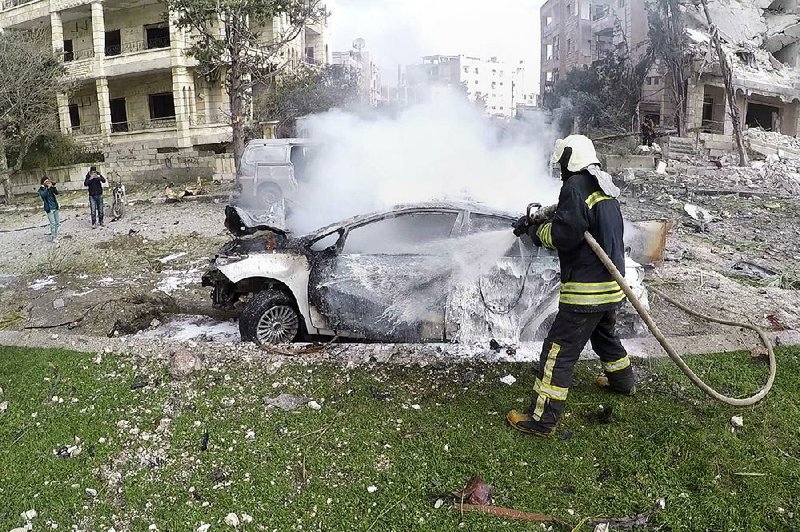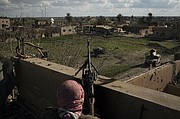BAGHOUZ, Syria -- The collection of tents was largely silent Monday on a sunny winter afternoon. Few people were visible, but those who were out and about were calm: Two men in long robes and pants walked slowly together through the grass, a woman leisurely left her tent to look around, and a man on a motorcycle drove toward the river.
They're on the last speck of land held by the Islamic State militant group -- a patch along the Euphrates River in eastern Syria where an estimated 300 militants are mixed in with hundreds of civilians, refusing to surrender and trying to negotiate an exit with the U.S.-backed forces surrounding them.
An Associated Press team got a rare glimpse of the militant-held settlement from a rooftop about a half-mile away during a media tour of the front lines, organized by the Syrian Democratic Forces. The roof looked out over a flat, green landscape with scattered palm trees, to an earthen berm and a line of pickups put up by the militants at the edge of the camp.
At one point, gunfire crackled in the distance. A Syrian Democratic Forces commander on the roof with a number of fighters said it isn't always so quiet. Only days earlier, the militants surprised the soldiers with an attempted night raid. The commander said his group can't assault the site or call in airstrikes because of the civilians, adding that his fighters have seen the militants moving civilians around at gunpoint as protection.
"They try a psychological war. But that is it! The war is over, and we won," said the commander, who spoke on condition he be identified only by his nom de guerre, Baran.
The tense standoff in the village of Baghouz is the endgame for the militant group that in 2014 controlled a vast stretch of territory across Syria and Iraq -- at one point nearly from Aleppo to Baghdad -- and ruled for years, aspiring to create an enduring and expanding jihadi state. The 300 militants in the pocket may include high-level figures and are believed to hold hostages.
Activists said a truce in place had been extended for five days as of Sunday. A person familiar with ongoing deliberations said the group has asked for an exit through a corridor to the rebel-held northwestern province of Idlib and demanded to be allowed to leave along with the civilians. The person spoke on condition of anonymity because he was not authorized to speak about the talks, which he described as taking place indirectly.
Baran said the militants had sent messages with civilians whom they allowed to leave up until last week. Since Wednesday, no civilians have left the pocket. The Syrian Democratic Forces denies any negotiations are taking place
The Britain-based Syrian Observatory for Human Rights, an activist group that monitors the civil war in Syria, said a request by the Islamic State to be evacuated to neighboring Iraq was also rejected. The militant group released 10 Syrian Democratic Forces fighters it had been holding on Sunday, but it was not clear what, if anything, the extremists would get in return, the Observatory said. Soldiers reported that some of their colleagues have also been released since then.
The Syrian Democratic Forces appears to be aiming to wait the militants out. "They don't have supplies in the area they are in that would last for a week or more," said Baran, the commander.
But DeirEzzor 24, an activist collective in eastern Syria, said several trucks loaded with food entered the Islamic State-held areas Sunday. It also reported the release of the Syrian Democratic Forces fighters, without saying whether there was a quid pro quo.
Villages leading to Baghouz lie mostly empty and destroyed, ghost towns where the only sign of life is wild grass that grew after weeks of rare heavy rain.
At least 62 people have died in recent weeks, mainly from exhaustion and malnutrition, after making their way out of militant-held territory, the International Rescue Committee said. Spokesman Paul Donohoe said two-thirds were children under the age of 1. He said they either died along the way or soon after arriving at a camp for the displaced.
More than 30,000 people who left the last Islamic State-held areas have arrived at the al-Hol camp in Syria's northern Hassakeh province in the past few weeks, raising the overall population of the camp to almost 42,000.
On Monday, President Donald Trump's demand that European countries take back their citizens fighting in Syria received a mixed reaction as nations voiced concerns about how to put home-grown Islamic State extremists on trial.
Britain refuses to take back citizens who joined the Islamic State and has stripped them of their citizenship. Belgium has said previously that it would not make any great effort to secure the release of 12 citizens imprisoned in Syria and two in Iraq.
Other European countries have remained largely silent about the fate of men and women whom many see as a security threat.
The case of a British teenager who ran away to join the Islamic State, has given birth to a baby boy and now wants to return to the U.K. has ignited debate in Britain about how to deal with citizens trying to leave Syria now that the extremist group's self-declared caliphate is collapsing.
"It is certainly not as easy as they think in America," German Foreign Minister Heiko Maas told reporters Monday at a meeting of EU foreign ministers. "German citizens have the right to return, but we have little ability in Syria at present to check whether German citizens are actually affected."
French jihadis made up the largest contingent of European recruits. French officials are concerned because in 2015 and 2016, an Islamic State cell of French and Belgian fighters crossed from Syria into Turkey, eventually launching deadly attacks on Paris and Brussels.
"The last territorial bastions of Daesh are falling, which doesn't mean that the action of Daesh is finished. On the contrary," said French Foreign Minister Jean-Yves Le Drian, using the Arabic acronym for the Islamic State.
Information for this article was contributed by Bassem Mroue, Lori Hinnant, Lorne Cook and Geir Moulson of The Associated Press.
A Section on 02/19/2019

